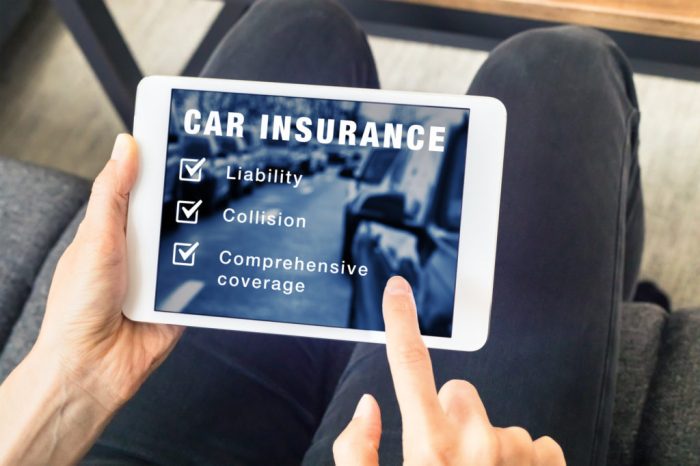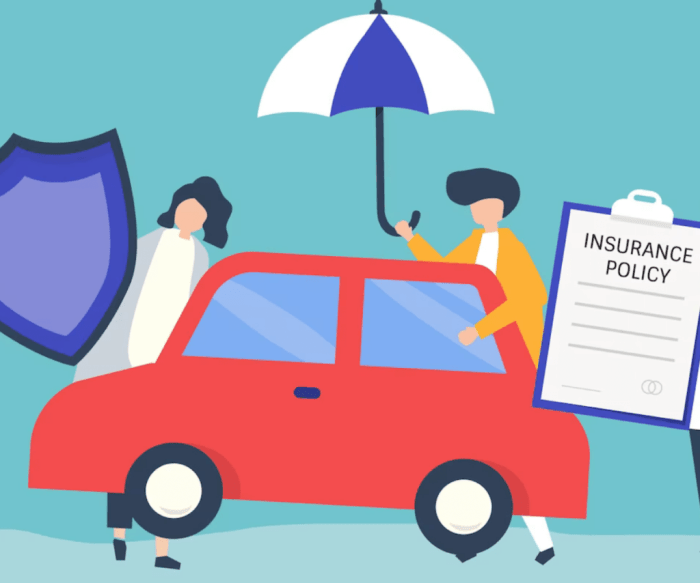Commercial auto insurance is your safety net when your business hits the road. Whether you’re a delivery driver, a construction company, or a fleet of trucks, this type of insurance safeguards your assets and your livelihood. Imagine this: a delivery driver gets into an accident, damaging the vehicle and injuring a pedestrian.
Without commercial auto insurance, the driver and the business could be facing hefty legal bills and potential financial ruin. That’s where commercial auto insurance steps in, providing crucial protection and peace of mind.
Think of commercial auto insurance as your business’s guardian angel on the road, covering everything from liability and collision to medical payments and even rental reimbursement. It’s a vital investment for any business that uses vehicles, ensuring that you’re protected from the unexpected.
What is Commercial Auto Insurance?

Commercial auto insurance is a specialized type of insurance that protects businesses from financial losses related to accidents, damage, or liability involving their vehicles. It’s designed to cover the unique risks faced by businesses that operate vehicles for work purposes, ensuring financial stability and protection in case of unforeseen events.
Types of Commercial Vehicles Covered
Commercial auto insurance covers a wide range of vehicles used for business operations.
- Cars: This includes sedans, hatchbacks, and SUVs used for business purposes, such as sales representatives, delivery drivers, or company executives.
- Trucks: This category encompasses a wide range of trucks, from small pickup trucks used for hauling goods to large semi-trailer trucks for long-haul transportation.
- Vans: Vans are commonly used for delivery services, transportation of passengers, or as mobile workshops, and are covered under commercial auto insurance.
- Motorcycles: Motorcycles used for business purposes, such as delivery or courier services, are also covered under commercial auto insurance.
- Other Vehicles: This category includes specialized vehicles used for business operations, such as construction equipment, tow trucks, and buses.
Businesses that Need Commercial Auto Insurance
A wide range of businesses require commercial auto insurance to protect their assets and operations.
- Transportation and Logistics Companies: Businesses involved in transporting goods or passengers, such as trucking companies, delivery services, and taxi companies, are highly dependent on vehicles and require comprehensive coverage.
- Construction Companies: Construction companies rely on trucks, excavators, and other heavy equipment for their operations, making commercial auto insurance crucial for protecting their investments.
- Retail Businesses: Retail businesses that use vehicles for deliveries, sales representatives, or transportation of inventory need commercial auto insurance to protect their assets and operations.
- Service Businesses: Businesses providing services, such as plumbing, electrical, or landscaping, often use vehicles to reach clients and transport equipment, requiring commercial auto insurance for protection.
- Non-Profit Organizations: Non-profit organizations that use vehicles for their operations, such as transporting clients or delivering supplies, need commercial auto insurance to ensure their financial stability.
Factors Affecting Premiums
Commercial auto insurance premiums are calculated based on a variety of factors, reflecting the unique risks associated with each business and its vehicles. Understanding these factors can help businesses make informed decisions about their insurance coverage and potentially reduce their premiums.
Driving History
Driving history is a significant factor in determining commercial auto insurance premiums. A company’s past driving record, including accidents, violations, and claims, directly influences the perceived risk associated with its vehicles.
- A clean driving record with no accidents or violations typically results in lower premiums, as it indicates a lower risk of future claims.
- Conversely, a history of accidents or violations can significantly increase premiums, as it suggests a higher likelihood of future claims.
Insurers often use a points system to assess driving history, where points are assigned for accidents, violations, and claims. A higher point total generally translates to higher premiums.
Vehicle Type, Commercial auto insurance
The type of vehicle used by a business is another crucial factor in determining premiums.
- Heavy-duty trucks, vans, and other commercial vehicles are typically associated with higher risks due to their size, weight, and potential for causing significant damage.
- Smaller vehicles, such as sedans or pickup trucks, generally have lower premiums, as they are considered less risky.
Insurers also consider the vehicle’s age, make, model, and safety features, as these factors can impact the likelihood of accidents and the severity of potential damage.
Business Operations
The nature of a business’s operations plays a significant role in determining its commercial auto insurance premiums.
- Businesses that operate in high-risk industries, such as construction or transportation, often face higher premiums due to the inherent risks associated with their operations.
- Businesses with low-risk operations, such as office administration or retail, may qualify for lower premiums.
The number of vehicles used by a business, the distance traveled, and the types of roads used also contribute to the risk assessment.
Location
The location where a business operates can also impact its commercial auto insurance premiums.
- Businesses operating in urban areas with high traffic density and congestion may face higher premiums due to the increased risk of accidents.
- Businesses operating in rural areas with lower traffic density and fewer hazards may qualify for lower premiums.
The climate and weather conditions in a location can also influence premiums, as they can affect road conditions and the likelihood of accidents.
Safety Programs and Risk Management Practices
Insurers often reward businesses that implement safety programs and risk management practices to reduce the likelihood of accidents.
- Companies with comprehensive driver training programs, vehicle maintenance schedules, and safety protocols may be eligible for discounts.
- Insurers may also offer discounts for businesses that install safety features in their vehicles, such as anti-lock brakes, airbags, and electronic stability control.
By demonstrating a commitment to safety, businesses can signal to insurers that they are taking proactive steps to mitigate risks, potentially leading to lower premiums.
Claims Process

Filing a claim for a commercial auto insurance policy can be a stressful experience, but understanding the process can help make it smoother. Here’s a step-by-step guide to navigate the process effectively.
Steps Involved in Filing a Claim
The process of filing a commercial auto insurance claim typically involves these steps:
- Contact Your Insurance Company:The first step is to notify your insurance company about the accident. This can be done by phone, email, or through their online portal. Be sure to provide all the necessary details about the accident, including the date, time, location, and any injuries or damages.
- File a Claim:Once you have contacted your insurance company, they will provide you with a claim form. Fill out the form accurately and completely, providing all the required information about the accident and your vehicle.
- Provide Documentation:You will need to provide your insurance company with supporting documentation to support your claim. This may include:
- A copy of your driver’s license and registration
- Police report
- Photos or videos of the accident scene and vehicle damage
- Estimates for repairs
- Medical bills if there are injuries
- Claim Review and Investigation:Your insurance company will review your claim and conduct an investigation. This may involve inspecting the damaged vehicle, interviewing witnesses, and reviewing the police report.
- Claim Settlement:Once the investigation is complete, your insurance company will make a decision on your claim. If your claim is approved, they will pay the costs of repairs or replacement, medical bills, and other expenses covered by your policy.
Documentation Required for a Successful Claim
Having the right documentation can significantly expedite the claim process and increase your chances of a successful outcome.
- Police Report:A police report serves as a neutral account of the accident, documenting the details of the incident and any witness statements.
- Photos and Videos:Visual evidence can be invaluable in supporting your claim. Capture clear photos and videos of the accident scene, vehicle damage, and any injuries.
- Witness Statements:If there were any witnesses to the accident, gather their contact information and obtain written statements about what they saw.
- Medical Records:If you sustained injuries in the accident, provide your insurance company with copies of your medical records, including treatment details and bills.
- Repair Estimates:Obtain estimates for repairs from reputable auto repair shops. This helps your insurance company assess the cost of repairs.
Handling Accidents and Protecting Your Rights
It’s important to know how to handle an accident and protect your rights as an insured.
- Safety First:If you are involved in an accident, prioritize safety. Ensure everyone involved is safe and check for any injuries.
- Exchange Information:Exchange contact and insurance information with all parties involved in the accident. This includes names, addresses, phone numbers, and insurance policy details.
- Document the Accident:Take notes about the accident, including the date, time, location, weather conditions, and a description of the accident.
- Contact the Authorities:If there are injuries or significant property damage, call the police to report the accident.
- Seek Medical Attention:If you are injured, seek medical attention immediately.
- Don’t Admit Fault:Avoid making statements that could be interpreted as admitting fault for the accident. Stick to providing factual information.
- Contact Your Insurance Company:Report the accident to your insurance company as soon as possible.
Choosing the Right Policy

Selecting the most appropriate commercial auto insurance policy can feel overwhelming, but it doesn’t have to be. By understanding your business needs and following some key steps, you can find the right coverage to protect your assets and peace of mind.
Comparing Quotes from Multiple Insurers
Comparing quotes from multiple insurers is crucial to finding the best value for your commercial auto insurance. This involves contacting several insurance companies, providing them with your business information, and requesting quotes for similar coverage.
- Benefits of Comparing Quotes:Comparing quotes helps you identify the insurer offering the most competitive price for the coverage you need. You can also use this information to negotiate a better rate with your preferred insurer.
- Using Online Comparison Tools:Many online comparison websites allow you to enter your information once and receive quotes from multiple insurers simultaneously. This saves you time and effort. However, remember to verify the accuracy of the information provided by these tools.
- Contacting Insurers Directly:While online comparison tools are convenient, it’s also a good idea to contact insurers directly to discuss your specific needs and get a personalized quote. This allows you to ask questions and ensure you understand the coverage offered.
Understanding Policy Terms and Conditions
Once you’ve received quotes from different insurers, it’s essential to carefully review the policy terms and conditions before making a decision. This step ensures you understand the coverage you’re getting and any exclusions or limitations.
- Key Policy Provisions:Pay attention to provisions like the coverage limits, deductibles, exclusions, and cancellation clauses. These elements can significantly impact your financial liability in case of an accident.
- Reading the Fine Print:Don’t hesitate to ask the insurer for clarification on any terms you don’t understand. It’s better to be safe than sorry and ensure you are fully aware of the policy’s details.
- Considering Additional Coverage:Some insurers offer additional coverage options, such as uninsured/underinsured motorist coverage, rental reimbursement, and roadside assistance. Evaluate your business needs and decide if these add-ons are worthwhile.
Industry Trends
The commercial auto insurance industry is constantly evolving, driven by technological advancements, changing risk profiles, and evolving customer expectations. Understanding these trends is crucial for businesses and insurers alike to adapt and thrive in this dynamic landscape.
Impact of Technology and Automation
Technology is revolutionizing the commercial auto insurance industry, leading to increased efficiency, improved customer experiences, and new risk management strategies.
Commercial auto insurance is a must-have for businesses that rely on vehicles, but what about protecting your most valuable asset – your family? Just like you secure your company’s vehicles, consider securing your family’s future with Term life insurance.
It provides financial security for your loved ones if the unexpected happens, giving you peace of mind to focus on your business and know your family is taken care of. And just like your commercial auto insurance protects your business from liability, term life insurance can protect your family from financial burdens.
- Telematics: Telematics devices installed in vehicles capture data like speed, braking, and location, providing valuable insights into driving behavior. Insurers use this data to offer usage-based insurance (UBI) programs, rewarding safer drivers with lower premiums.
- Artificial Intelligence (AI): AI algorithms are being used to automate tasks like claims processing, fraud detection, and risk assessment. This enables faster and more accurate decision-making, reducing manual effort and improving efficiency.
- Data Analytics: Advanced data analytics tools help insurers identify emerging risks, understand customer needs, and tailor policies to specific business requirements.
Conclusive Thoughts
Navigating the world of commercial auto insurance can feel like driving through a maze, but it doesn’t have to be a stressful journey. By understanding your coverage options, factors affecting premiums, and the claims process, you can make informed decisions to protect your business and ensure a smooth ride.
Remember, a little bit of research and planning can go a long way in safeguarding your business’s future. So, buckle up and let’s get this insurance journey started!
Helpful Answers
What types of businesses need commercial auto insurance?
Any business that uses vehicles for work purposes, such as transportation, delivery, construction, or service, needs commercial auto insurance. This includes companies with a single vehicle or a large fleet.
How often should I review my commercial auto insurance policy?
It’s a good idea to review your policy at least annually, or whenever your business experiences significant changes, such as adding new vehicles, expanding operations, or changing drivers.
What are the benefits of having a good driving record?
A good driving record can significantly lower your commercial auto insurance premiums. It shows insurers that you’re a responsible driver, which reduces their risk.
What if I’m not sure what type of commercial auto insurance I need?
Don’t worry, that’s what insurance agents are for! They can help you assess your needs and recommend the right policy for your business.